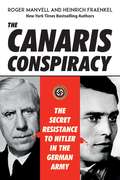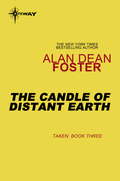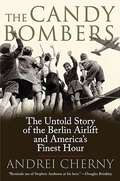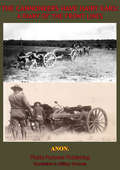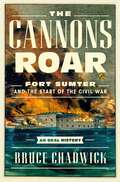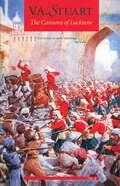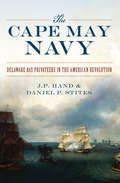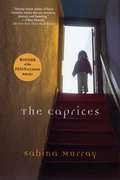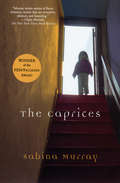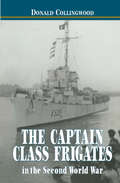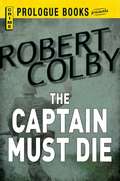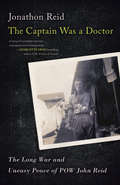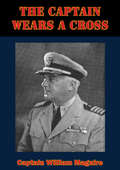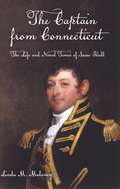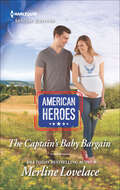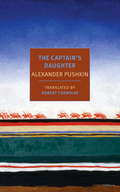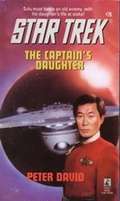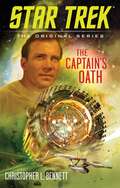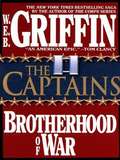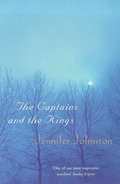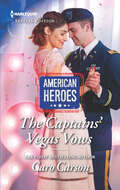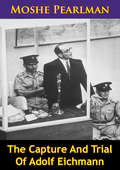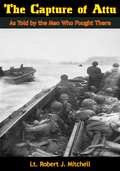- Table View
- List View
The Canaris Conspiracy: The Secret Resistance to Hitler in the German Army
by Heinrich Fraenkel Roger ManvellJuly 20, 1944. Colonel Claus von Stauffenberg carried a time bomb in a briefcase into a conference with Adolf Hitler. After wedging the briefcase directly in front of Hitler under a table, Stauffenberg took his leave. Only ill luck and divine providence could have caused what happened next; a junior staffer accidentally kicked the case, moving it further from Hitler. When the bomb exploded, four died, but none was the megalomaniacal Führer. Men from all walks of German life—the army, Military Intelligence, civilian life—came together at great personal risk to conspire over a span of six years to save their beloved Germany from the clutches of a madman and halt a further descent into war. This is the incredible documented account of their work and collaboration with “Department Z,” the twenty-four individuals who operated under the leadership of Admiral Wilhelm Canaris to secretly engineer this intricate scheme to kill Adolf Hitler and take over the Third Reich. Only by a matter of minutes and inches did these courageous men fail in their daring plot, changing the course of history. Meet the conspirators and learn the plots behind The Canaris Conspiracy, a near-continuous web of planning and frustrated action which came nearer to achieving the longed-for coup d’état than anyone realizes.
The Candle of Distant Earth
by Alan Dean FosterMarcus Walker, a former hotshot commodities broker, and a wisecracking dog named George, who has been speech-enhanced to increase his market value, have escaped their alien Vilenjji captors, who saw the two as cuddly extra-terrestrial "pets" to be sold for a hefty sum. But Walker hasn't a clue which way will lead him back home to Chicago. With the Vilenjji hot on his trail, Walker must pull off the impossible and pinpoint his needle of a solar system in the universal haystack. Will the unrelenting Vilenjji get to him before he reaches Wrigley Field? Yep, it's a wide-open universe out there, bursting with possibilities - and Walker's going to get hit with all of them.
The Candy Bombers
by Andrei ChernyThe Candy Bombers is the true tale of the ill- assorted group of castoffs and second-stringers who saved millions of desperate people from a dire threat. By feeding and supplying West Berlin by air for nearly a year, these brave men won the hearts of America's defeated enemies, and inspired people around the world to believe in America's fundamental goodness. Their valor and kind acts helped the country avoid World War III, and won the greatest battle of the Cold War-without firing a shot.
The Cannoneers Have Hairy Ears: A Diary Of The Front Lines
by Anon.An American Captain tells the story of his unit of artillery in the Front Lines of the Western front through the battles of St Mihiel and the Argonne to the ceasefire.An acclaimed classic account of an American Officer whose battery fought bravely as part of the American Expeditionary Forces in 1918. The unedited journal, which was kept by the author on his person at all times, is a gem of reportage filled with scenes that vividly portray the battle front and at times the sheer brutality of war. His unit were cited for their accurate and deadly work with their French-made 75 mm. guns, and despite the unit not often being more than 1000 yards away from the trenchlines the efficiency of the battery allowed the author time to write. Not polished or damaged by post-war editing the author's diary retains its freshness and immediacy of the shell-torn trenches of the French countryside."Diary, August--November 1918, of a U.S. Field Artillery unit--75mm guns--attached to the 33rd Division. One of the best American artillery accounts" - p. 120, Edward Lengel, World War I Memories, 2004, The Scarecrow Press, Lanham Maryland, Toronto, Oxford.
The Cannons Roar: Fort Sumter and the Start of the Civil War—An Oral History
by Bruce ChadwickThe first-ever oral history of the attack that started the Civil War that combines illuminating historical narrative with intense first-hand accounts. On April 12, 1861, Confederate troops began firing on Fort Sumter, beginning the bloodiest conflict in American history. Since that time numerous historians have described the attack in many well-regarded books, yet the event still remains overlooked at times in the minds of the public. The Cannons Roar seeks to remedy that. Rather than providing a third-person, after-the-fact description, acclaimed author Bruce Chadwick will tell the story of the attack from the people who were in the thick of it. In so doing, readers can hear from people themselves, telling a compelling story in a new way that both draws readers in and lets them walk away with a better understanding and appreciation of one of the most dramatic and important events in our nation&’s history. The Cannons Roar will not only provide portraits of the major players that are more descriptive than those offered by historians over the years, it will give voice to dozens of regular people from across the country and socioeconomic spectrum, to provide readers with a true and complete understanding of the mood of the country and in Charleston. Using letters, newspaper articles, diaries, journals, and other written sources, Chadwick describes in vivid detail the events preceding the attack, the attack itself, and its aftermath. While we hear from historic pillars like Abraham Lincoln to PGT Beauregard to Jefferson Davis, Chadwick also features Charleston merchants and Northern farmers, high society doyennes and &“the dregs,&” South Carolina&’s new governor Francis Pickens, who was the blustery former Minister to Russia. Collectively, readers will obtain a fuller understanding of the politics and thinking of political and military leaders that influenced their decisions or lack thereof. The book will also capture both the South and North&’s expectations regarding England entering the war (as well as letters from England&’s leaders showing their reluctance to do so), as well as an expectation on both sides of a quick resolution. Skillfully combining traditional history with the in-the-moment ethos of an oral history, The Cannons Roar to bring this historic moment in American history to new and vivid life.
The Cannons of Lucknow
by V. A. StuartCawnpore is retaken, but they have come too late to stop the slaughter—the relieving British soldiers can only stare at the ill-sited, poorly-defended entrenchment and shake their heads, wondering why. One of only two survivors, Colonel Alex Sheridan is numb. His wife and newborn son lie dead. But now he must join General Havelock's force of barely a thousand men as they fight their way through to the besieged garrison at Lucknow.
The Cape May Navy: Delaware Bay Privateers in the American Revolution
by J.P. Hand Daniel P. StitesThe Delaware Bay during the Revolutionary War was vital for trade and home to a host of armed conflicts between British vessels and American privateers. Cape May County captains in their light, fast vessels captured dozens of British merchant ships off the Atlantic coast. At the Battle of Delaware Bay, Lieutenant Joshua Barney aboard the Hyder Ally overcame massive odds and defeated the British warship General Monk. Colonel Elijah Hand, local hero of the skirmish at Quinton's Bridge, took his military talents to the seas, where he dueled with Tory privateers. Still in his twenties, Yelverton Taylor captured the Triton with hundreds of Hessian soldiers on board. Authors James P. Hand and Daniel P. Stites chart the exciting history of the Cape May Navy in the War for Independence.
The Caprices
by Sabina MurrayWinner of the PEN/Faulkner award for fiction in 2003, The Caprices is a collection of stories artfully told across the theatre of the Pacific Campaign of World War II. An Anglo-Indian cavalryman, his homeland on the brink of revolution, finds himself in Malaysia fighting to protect British interests. Two soldiers lost in the jungle with a Japanese prisoner confront their prejudices toward each other, and the nature of being American. An island witnesses the passing of history from Magellan, to Amelia Earhart, to the dropping of the atomic bomb. With exquisite lyricism tempered by a journalist’s eye for detail, Murray shines light on the tangle of battles created by that conflict, the violent reach across the generations, the shattering reverberations in memory. With this collection, Sabina Murray established herself as a passionate and wise voice of literary fiction.
The Caprices
by Sabina MurrayWinner of the PEN/Faulkner Award. A collection of stories artfully told across the theatre of the Pacific Campaign of World War II. An Anglo-Indian cavalryman, his homeland on the brink of revolution, finds himself in Malaysia fighting to protect British interests. Two soldiers lost in the jungle with a Japanese prisoner confront their prejudices toward each other, and the nature of being American. An island witnesses the passing of history from Magellan, to Amelia Earhart, to the dropping of the atomic bomb. With exquisite lyricism tempered by a journalist&’s eye for detail, Murray shines light on the tangle of battles created by that conflict, the violent reach across the generations, the shattering reverberations in memory. With this collection, Sabina Murray established herself as a passionate and wise voice of literary fiction. &“In this sobering book, [Murray] turns the bombed-out and broken setting of World War II into a theater for humankind, where both weakness and grace are writ large.&” —The Washington Post
The Captain Class Frigates in the Second World War
by Donald CollingwoodThis is the first book to fully document the story behind the Frigates that played such a vital role during World War Two.
The Captain Must Die
by Robert ColbyFor twelve long years they remembered. For twelve long years they plotted. And now Captain Driscoll was going to pay for what he had done to them during the war. They weren’t going to kill him right away. First there would be only little things, irritating things, that would build and grow and tighten until Captain Driscoll became afraid. Then they’d begin their reign of terror. That would be the best part. The three revenge-hungry men would savor those moments like a good wine. And when Captain Driscoll was a broken, sobbing man, when his sanity was almost gone, they would murder him.
The Captain Was a Doctor: The Long War and Uneasy Peace of POW John Reid
by Jonathon ReidA Canadian medical officer and prisoner of war returns from the Second World War a hero — and a very different man. In August 1941, John Reid, a young Canadian doctor, volunteered to join the Royal Canadian Army Medical Corps with four friends from medical school. After five weeks of officer training in Ottawa, Reid took an optional two-week course in tropical medicine, a choice which sealed his fate. Assigned to “C” Force, the two Canadian battalions sent to reinforce “semi-tropical” Hong Kong, he was among those captured when the calamitous Battle of Hong Kong ended on Christmas Day. After a year in Hong Kong prison camps, Reid was chosen as the only officer to accompany 663 Canadian POWs sent to Japan to work as slave labourers. His efforts over the next two and a half years to lead, treat, and protect his men were heroic. He survived the war, but finding a peace of his own took ten tumultuous years, with casualties of a different sort. He would never be the same.
The Captain Wears A Cross
by Captain William Maguire“THIS IS A BOOK about the men of our Navy written by a man who must know as many of them, and know them as well, as anyone who ever wore the Navy’s blue. Chaplain Maguire has, as much as any man I have ever known, a talent which is rare—the talent of knowing other men, not superficially or carelessly or through a veil of personal preconception, but as they are. To the varied, exacting tasks of his profession, he brings deep sympathy for other men and wide tolerance of their human foibles.Chaplain Maguire’s new book reflects the qualities of its author. It also reflects, to the discerning reader, the spirit which makes the United States Navy the great fighting team it is proving itself to be as I write these words. This is a book of countless stories of Navy men and of the families of Navy men. It shows them in battle and at prayer, in their homes and in their quarters. It tells alike of apprentice seamen and of admirals, because Chaplain Maguire is interested in all kinds of men. It tells of Catholics and Protestants and Jews; of serene men and worried men; of heroic death in line of duty and of long lives devoted to that same duty. There are stories in this book of that grim day at Pearl Harbor, when the men of our Navy came back fighting from a cowardly, bitter blow. There are stories of the distant days of peace, and of the closer, harder days which have come since the Japs stealthily attacked our ships as they lay at anchor.It is a casual, discursive book and it is almost all about men of the Navy. Those who read it, if they read thoughtfully, will discover much of what our Navy is. They will better understand the fighting spirit, the heroism and the fortitude of our men, already exemplified so often and so gloriously in this war and among the best assurances of the war’s successful outcome. For the men of whom Chaplain Maguire writes are typical of our Navy. So is the officer who writes of them.”-Foreword
The Captain from Connecticut
by Linda M. MaloneyThe Captain from Connecticut is the definitive biography of the man who became a national hero as the commander of the USS Constitution in her dramatic victory over HMS Guerriere in the War of 1812. While Isaac Hull's outstanding seamanship was in evidence throughout his career, Maloney makes the case that it is ironic that he is remembered for his tactical prowess in this famous battle, because he was actually the most pacific of men.
The Captain's Baby Bargain: Tempted By Her Island Millionaire / The Captain's Baby Bargain (american Heroes) (American Heroes Ser. #39)
by Merline LovelaceTwo words change her world… “You’re pregnant.” After one hot night, Captain Suzanne Hall remembers everything she craved about her sexy ex-husband. But when duty calls, she remembers everything that separated them. Till she finds out she’s pregnant! A former soldier, Gabe is rooted in his hometown, while Suzanne flies around the world. But with his baby in the balance, there are only three words he can utter: “Marry me. Again.”
The Captain's Christmas Bride: Lord Lansbury's Christmas Wedding His Christmas Countess The Captain's Christmas Bride
by Annie BurrowsA spoiled socialite uses a compromising situation to trap the wrong man into marriage in this Regency holiday romance.Wrong man . . .Lady Julia Whitney is at her wit’s end. Her perfect beau just won’t propose! But she’s struck upon a plan to ensure her marriage by Christmas. Between masquerades and mistletoe, she finds herself fully compromised . . . by the wrong man!. . . Right husband?Captain Dunbar cannot believe he’s fallen for this chit’s game! Now he must marry society miss Lady Julia with nothing to connect them other than incredible passion. But he’s about to discover that the best Christmas presents come in surprising, and delightful, packages!
The Captain's Daughter
by Alexander Pushkin Robert Chandler Elizabeth ChandlerAn NYRB Classics OriginalAlexander Pushkin's short novel is set during the reign of Catherine the Great, when the Cossacks rose up in rebellion against the Russian empress. Presented as the memoir of Pyotr Grinyov, a nobleman, The Captain's Daughter tells how, as a feckless youth and fledgling officer, Grinyov was sent from St. Petersburg to serve in faraway southern Russia. Traveling to take up this new post, Grinyov loses his shirt gambling and then loses his way in a terrible snowstorm, only to be guided to safety by a mysterious peasant. With impulsive gratitude Grinyov hands over his fur coat to his savior, never mind the cold. Soon after he arrives at Fort Belogorsk, Grinyov falls in love with Masha, the beautiful young daughter of his captain. Then Pugachev, leader of the Cossack rebellion, surrounds the fort. Resistance, he has made it clear, will be met with death. At once a fairy tale and a thrilling historical novel, this singularly Russian work of the imagination is also a timeless, universal, and very winning story of how love and duty can summon pluck and luck to confront calamity.
The Captain's Daughter (Star Trek: The Original Series #76)
by Peter DavidA Star Trek adventure set during The Original Series era from New York Times bestselling author Peter David!When Demora Sulu, an exemplary young Starfleet officer, suddenly attacks her commanding officer, who kills her in self-defense, everyone is stunned. No one is more grief-stricken than her father, Captain Hikaru Sulu of the U.S.S. Excelsior. Determined to learn the truth behind his daughter's bizarre death, Sulu goes to the planet where she was killed, and finds himself confronted by an old enemy eager to destroy Sulu's reputation and his life!
The Captain's Oath (Star Trek: The Original Series)
by Christopher L. BennettAn all-new Star Trek adventure set during The Original Series era and featuring James T. Kirk! The saga of James T. Kirk&’s historic command of the U.S.S. Enterprise is known throughout the galaxy. But one part of the legend has barely been touched upon until now: the story of Kirk&’s first starship command and the remarkable achievements by which Starfleet&’s youngest captain earned the right to succeed Christopher Pike as the commander of the famous Enterprise. From his early battles with the Klingons to the rescue of endangered civilizations, Kirk grapples with difficult questions: Is he a warrior or a peacemaker? Should he obey regulations or trust his instincts? This thrilling novel illustrates the events and choices that would shape James T. Kirk into one of the most renowned captains in Starfleet history.
The Captains (Brotherhood of War #2)
by W.E.B. GriffinIt was more than an incident. It was a deadly assault across the 38th parallel. It was the Korean War. In the fear and frenzy of battle, those who had served with heroism before were called again by America to man the trenches and sandbag bunkers. From Pusan to the Yalu, they drove forward with commands too new and tanks too old: brothers in war, bonded together in battle as they had never been in peace...
The Captains and the Kings
by Jennifer JohnstonMr Prendergast, an elderly Anglo-Irishman, is living out his last years in the decaying splendour of his family mansion. As his mind wanders through the gloom he finds it peopled with memories of his neglected wife, his pale shadow of a father, his icily glamorous mother and Alexander, the son she so jealously loved, killed in the First World War. With only his ill-tempered alcoholic gardener left to attend to him, Mr Prendergast is content to pass his days in such ghostly company. Until young Diarmid arrives, keen-eyed and carrot-haired, to disperse the gathering darkness with curiosity, and the promise of friendship.
The Captains and the Kings: A Novel
by Jennifer JohnstonMr Prendergast, an elderly Anglo-Irishman, is living out his last years in the decaying splendour of his family mansion. As his mind wanders through the gloom he finds it peopled with memories of his neglected wife, his pale shadow of a father, his icily glamorous mother and Alexander, the son she so jealously loved, killed in the First World War. With only his ill-tempered alcoholic gardener left to attend to him, Mr Prendergast is content to pass his days in such ghostly company. Until young Diarmid arrives, keen-eyed and carrot-haired, to disperse the gathering darkness with curiosity, and the promise of friendship.
The Captains' Vegas Vows (American Heroes #42)
by Caro CarsonAfter a Vegas wedding, she loses her memory but may still end up with a winning hand in this charming military romance from the USA Today–bestselling author.2019 Rita Award FinalistThey have ninety days before the state of Texas will grant these strangers a divorce from their impetuous Vegas wedding. Captain Helen Pallas is certain she’s not cut out for marriage. And Captain Tom Cross doesn’t believe in love. Yet working in the same unit—and assigned to married quarters—Helen and Tom know the attraction is real. It’s a long shot, but happily-ever-after may still be in the cards.“So here’s a slight twist on the infamous ‘Vegas quickie wedding’ theme with added military elements . . . I also liked that the realities and challenges of women in the Army are mentioned and a part of the story.” —Dear Author
The Capture And Trial Of Adolf Eichmann
by Moshe PearlmanIncludes, as an Appendix, a full text of the Indictment, translated from the Hebrew.The horror trial of the 20th century has been that of Adolf Eichmann, Obersturmbannführer of Germany's death camps--the man who, between 1939-1945, in one way or another, caused the killing of six million men, women, and children.Out of mountains of courtroom evidence, both live and documentary, Pearlman renders a relevant, reliable account of the drama. The whole story is here: from the capture in Argentina, to the world-famed image of the twitching man in the glass-enclosed dock as he listened to the sagas of the ghetto fighters, the confrontation of the accused and witnesses who came back as if from the dead, the indictment enunciated by Hausner, and the defense arguments of Servatius. And lastly the words of Eichmann himself: "I received orders and I executed orders."A gripping read.
The Capture of Attu: As Told by the Men Who Fought There
by Lt. Robert J. MitchellThis book attempts to put the reader on the battlefield with the ground soldier. Men who fought on Attu, officers and enlisted men, told their stories to Lieutenant Robert J. Mitchell of the 32nd Infantry, one of the regiments engaged. Lieutenant Mitchell was wounded during the latter stage of the battle and while convalescing wrote the accounts which are now published as Part Two of the book. These stories tell of the discomforts and perils, the failures and successes, the fear and courage, the many fights between small groups and the occasional humor, of which battle consists. In preparing these accounts for publication, every effort has been made to keep them as nearly as possible in the exact form in which they were written down by Lieutenant Mitchell; consequently, a minimum of editorial changes has been made.Part One, written by Sewell T. Tyng, is an introduction in the form of a connected narrative of events leading up to the invasion of the Aleutian island of Attu and a detailed account of the battle which resulted in the capture of Attu by American forces. This narrative is based on official sources and on material collected by Captain Nelson L. Drummond, Jr., Field Artillery, formerly of the Alaska Defense Command. Captain Drummond visited Attu shortly after the battle, studied the terrain, and interviewed participants of all ranks.The volume has been prepared in the War Department under the supervision of the Military Intelligence Division. Aerial photographs are by the 11th Air Force; battle photographs are by the U.S. Army Signal Corps; and terrain feature photographs are by Captain Drummond, assisted by Private First Class A. E. Johnson, 50th Engineer Regiment. The panoramic sketch is based on an original by the 50th Engineer Regiment.
